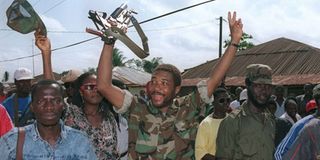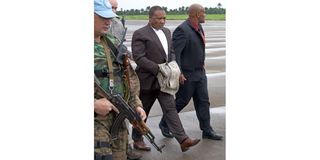Premium
Liberia's long wait for justice after 14 years of bloodshed

Liberian rebels celebrate in Monrovia on August 5, 2003.
Monrovia
Liberia's back-to-back civil wars were some of the bloodiest in African history, leaving an estimated 250,000 dead after 14 years of appalling bloodshed.
Although the fighting ended in 2003, very few of those responsible for war crimes have been tried.
The conflicts were marked by mass murders, rape and mutilations, with warlords using child soldiers.
Atrocities against civilians were common with drugged-up fighters chopping off people's limbs.
No one has been prosecuted in Liberia itself, with many of the guiltiest still powerful figures there.
But cases are underway in other countries, with Finland putting Gibril "Angel Gabriel" Massaquoi — a Sierra Leone rebel who fought in Liberia — on trial Wednesday accused of murder, rape and recruiting children.
It follows France and Switzerland putting two other commanders in the dock in December.

Liberian rebel leader Charles Taylor (centre) celebrating on July 21, 1990 with troops after taking over Roberts Field from Samuel Doe’s troops.
Bloody chaos
The first Liberian civil war started in December 1989 when Charles Taylor's National Patriotic Front (NPFL) launched a rebellion to oust the authoritarian president Samuel Doe, who had murdered the country's previous leader in a bloody coup.
Taylor quickly took control of most of the country but not the capital, Monrovia, where an African force was present.
After Monrovia finally fell, Taylor was elected president in 1997, but within two years another rebellion erupted and he lost much of the country.
The second civil war ended with a three-month siege of Monrovia in 2003, with Taylor fleeing to Nigeria.
At least a quarter of a million people perished in the decade and a half of chaos, with a third of the country's population turned into refugees.
The wars were marked by numerous massacres, with some of the worst abuses perpetrated by government forces.
A truth and reconciliation commission was set up in 2006 to probe crimes committed during the war, but its recommendations -- published in 2009 — have remained largely unimplemented in the name of keeping the peace.
Warlords it incriminated are still considered heroes in their communities.

Former Liberian president Charles Taylor (centre) being escorted by UN officials from a helicopter at Freetown airport on June 20, 2006 to a plane for the Netherlands.
Taylor's child soldiers
Taylor was convicted by an international criminal court in 2012 of 11 counts of war crimes and crimes against humanity in neighbouring Sierra Leone, which was also dragged into the bloodbath.
His 50-year sentence was confirmed in 2013, and he is serving his sentence in Britain.
But he has never been tried over events in Liberia, where his fighters earned a reputation for extreme violence and were among the first to force children, some as young as 10, to carry guns.
His son "Chuckie" Taylor was sentenced to 97 years in prison in a US federal court in 2009 for torturing and killing people while he was the head of Liberia's anti-terrorist services.
Justice abroad?
Two years ago ex-warlord Mohammed "Jungle Jabbah" Jabateh was jailed for 30 years in the US for lying about his past as a leader of a force that carried out multiple murders and acts of cannibalism.
Another former warlord Alieu Kosiah went on trial in Switzerland in December, becoming the first Liberian to face prosecution for war crimes over the atrocities committed in the country.
Kunti Kamara, another former rebel commander, was also ordered to stand trial in France accused of torture and complicity in acts of torture in the 1990s.
Massaquoi is accused of murder, rape and recruiting child soldiers between 1999 and 2003 when he held a senior position in the Revolutionary United Front, a Sierra Leone rebel group that fought in Liberia. He denies the charges.
The underlying causes of the conflict -- including ethnic divisions and economic disparities in the country -- remain unresolved.
Liberia, which was colonised by freed black slaves from the United States and the Caribbean in the 19th century, was also ravaged by the Ebola epidemic between 2014 and 2016.




